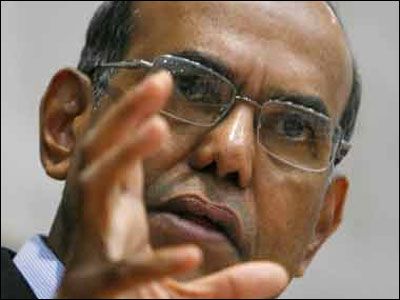 'Did I make a costly misjudgement of the market reaction?' Subbarao wrote
'Did I make a costly misjudgement of the market reaction?' Subbarao wrote
As Governor of the Reserve Bank of India, Duvvuri Subbarao's most formidable challenge was to manage the currency crisis of 2013 and not the global financial crisis of 2008-09, the former governor reveals in his book to be released on Friday.
And steps to fight the crisis were taken jointly by Subbarao and his successor Raghuram Rajan, who was the chief economic advisor and then working from RBI, getting familiarised to his next role as governor.
"As chief economic advisor to the government, Raghu was on board all through the exchange rate turmoil and was more actively involved in all the decisions after he was named in early August as my successor," Subbarao wrote in his book Who Moved My Interest Rate.
In fact, some of the resolution mechanism was also decided a few days before Subbarao's retirement, but he let Rajan announce those given his "formidable reputation".
The rupee tumbled to its lifetime low of 68.85 a dollar on August 28, 2013, roughly a week before Subbarao's term came to an end.
In the course of a few months, the rupee fell 17 per cent to close at 67.03 a dollar on September 4, 2013, -- the day when Subbarao stepped down.
The provocation for the currency crisis was the "taper tantrum" of the US Federal Reserve.
In May 2013, then Fed chairman Ben Bernanke said the central bank would roll back its easy money policy and start normalising. Global currencies tumbled as investors rushed to safe-haven dollar investments.
India, being one of the "fragile five", was one of the worst impacted.
According to Subbarao, the pressure on the currency was inevitable and blaming the global developments could be an easy way out.
At the heart of India's external economy problem were domestic vulnerabilities, Subbarao tried to reason with then finance minister P Chidambaram, but he was "always dismissive of this view".
"He is too intelligent not to have seen the point; I suspect he found it politically convenient to point to an external scapegoat rather than call attention to domestic structural factors," the former RBI governor wrote.
Rajan on his first day as governor on September 4 announced measures such as opening the forex window for oil companies and allowing banks to raise tier-II bonds from the overseas market and swapping them with RBI.
Rajan offered that the outgoing governor announce those measures.
But Subbarao let Rajan announce the measures as the outgoing governor thought "that the measures would be more effective if he (Rajan) announced them as incoming governor".
The central bank regularly intervened in the currency market to cool off the exchange rate and tried to manage expectations and contain herd behaviour in the market by implementing measures to augment inflows and stem outflows, he said.
RBI eased external commercial borrowings rates, forced the corporate sector to bring dollars raised abroad immediately to the country, told banks to make clients hedge their exposures, withdrew the ceiling on interest rate cap for non-resident accounts, and restricted speculators and banks from taking positions in the currency.
Restraining gold imports also helped in bringing down the current account deficit to 1.7 per cent of the gross domestic product (GDP) in 2013-14, from 4.8 per cent in 2012-13.
However, by restricting the liberalised remittance scheme and raising the emergency borrowing rate of banks by two percentage points, Subbarao unwittingly indicated to the market that the central bank could be in a panic.
"Did I make a costly misjudgement of the market reaction?
"That's a question that I agonised over all through the next couple of weeks till I left the Reserve Bank and indeed several times even afterwards," Subbarao wrote.
Image: Former RBI Governor D Subbarao. Photograph: Reuters











